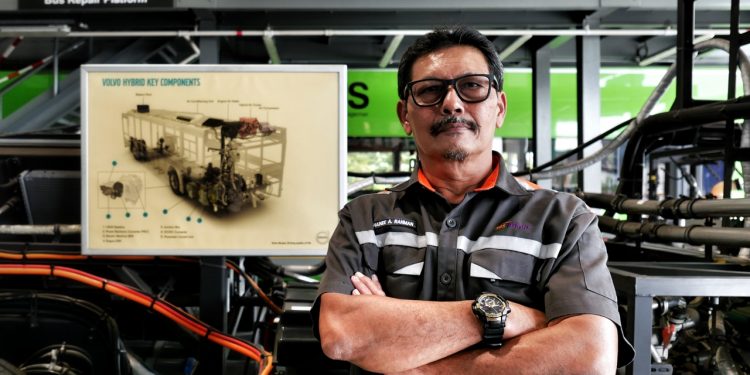As we move towards a more sustainable future through the adoption of low-carbon technologies, provisions must be made to ensure that the workforce understands how to operate and service the new equipment and machinery.
One such company which has well-prepared itself for such an eventuality is public bus operator, SBS Transit.
Working together with the National Transport Workers Union (NTWU) and the Land Transport Authority (LTA ), SBS Transit has been consistently upskilling its technicians. Many of the workers can now service both the company’s conventional combustion engine vehicles, as well as their newer and greener hybrid and electrical fleet.
One such worker to benefit from the training is Hainee Abdul Rahman, 63.
Through the Years
Ever since he was young, Mr Hainee has had a profound interest in all things automotive and mechanical.
So much so that right after he completed his National Service, he immediately approached SBS Transit for employment.
Armed with only his ‘O’ Level certificate and his passion, he started off as an apprentice with the bus operator back in 1979.
Over the years, he has consistently kept himself up to date with the advances in his industry. Today, the father of two and grandfather of five is a master technical specialist with the company.
“I have worked with SBS Transit for over 42 years,” he said .
His long service makes him one of the company’s most experienced technicians with the know-how on servicing both the more conventional diesel-powered fleet, to the more modern fully electric buses.
On Training
Unlike those who shy away from upskilling, Mr Hainee has never feared training and approaches it with full positivity.
“Once I attended the courses, I got to know much more about the vehicles and how to service them. It was challenging, but it helped me stay relevant,” he shared.
In 2017, he traveled to Sweden to learn how to service his company’s hybrid fleet of vehicles. This was followed by a course on maintaining the electric buses which he just undertook last year.
Even though he possessed great interest in the subject matter, that is not to say that he did not face any difficulties during his training.
“During the training, you learn about the safety features and how to do the decommissioning [of the vehicles] … the hardest part for me was probably the calculations like Ohm’s Law, which I had to recap again, you know? It has been such a long time since I’ve done such calculations,” he said.
While one would assume that servicing the electrical buses would be more complex, Mr Hainee feels that the newer fleet is in fact easier to service as compared to the older buses.
He said: “The older buses were a bit more difficult to troubleshoot. But with the newer buses, we have the diagnostic report from the computer which can tell us exactly what is wrong.”
On Retirement and Redundancy
When asked if he felt threatened by the younger workers joining the industry, Mr Hainee appeared unfazed – probably because he knows he has a lot more to offer.
“I love to share [knowledge]. Even with my colleagues I will also share. What I know I will pass to them because in the future, when I retire, they will be the ones doing the job,” he explained.
And as far as he knows, he wants to be employed for as long as he can work.
“I don’t want to stay home, that is not for me… Plus I love my job, that is why I have stayed on for so long,” he said with a chuckle.

